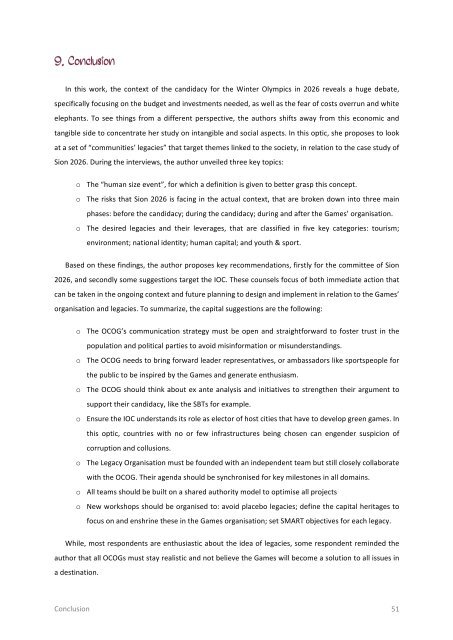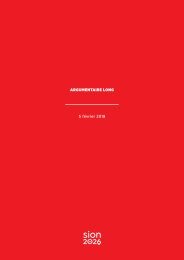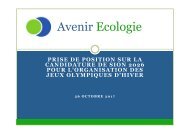Reviving the Flame
Travail de Master de Tiffany Duc
Travail de Master de Tiffany Duc
Create successful ePaper yourself
Turn your PDF publications into a flip-book with our unique Google optimized e-Paper software.
9. Conclusion<br />
In this work, <strong>the</strong> context of <strong>the</strong> candidacy for <strong>the</strong> Winter Olympics in 2026 reveals a huge debate,<br />
specifically focusing on <strong>the</strong> budget and investments needed, as well as <strong>the</strong> fear of costs overrun and white<br />
elephants. To see things from a different perspective, <strong>the</strong> authors shifts away from this economic and<br />
tangible side to concentrate her study on intangible and social aspects. In this optic, she proposes to look<br />
at a set of “communities’ legacies” that target <strong>the</strong>mes linked to <strong>the</strong> society, in relation to <strong>the</strong> case study of<br />
Sion 2026. During <strong>the</strong> interviews, <strong>the</strong> author unveiled three key topics:<br />
o The “human size event”, for which a definition is given to better grasp this concept.<br />
o The risks that Sion 2026 is facing in <strong>the</strong> actual context, that are broken down into three main<br />
phases: before <strong>the</strong> candidacy; during <strong>the</strong> candidacy; during and after <strong>the</strong> Games’ organisation.<br />
o The desired legacies and <strong>the</strong>ir leverages, that are classified in five key categories: tourism;<br />
environment; national identity; human capital; and youth & sport.<br />
Based on <strong>the</strong>se findings, <strong>the</strong> author proposes key recommendations, firstly for <strong>the</strong> committee of Sion<br />
2026, and secondly some suggestions target <strong>the</strong> IOC. These counsels focus of both immediate action that<br />
can be taken in <strong>the</strong> ongoing context and future planning to design and implement in relation to <strong>the</strong> Games’<br />
organisation and legacies. To summarize, <strong>the</strong> capital suggestions are <strong>the</strong> following:<br />
o The OCOG’s communication strategy must be open and straightforward to foster trust in <strong>the</strong><br />
population and political parties to avoid misinformation or misunderstandings.<br />
o The OCOG needs to bring forward leader representatives, or ambassadors like sportspeople for<br />
<strong>the</strong> public to be inspired by <strong>the</strong> Games and generate enthusiasm.<br />
o The OCOG should think about ex ante analysis and initiatives to streng<strong>the</strong>n <strong>the</strong>ir argument to<br />
support <strong>the</strong>ir candidacy, like <strong>the</strong> SBTs for example.<br />
o Ensure <strong>the</strong> IOC understands its role as elector of host cities that have to develop green games. In<br />
this optic, countries with no or few infrastructures being chosen can engender suspicion of<br />
corruption and collusions.<br />
o The Legacy Organisation must be founded with an independent team but still closely collaborate<br />
with <strong>the</strong> OCOG. Their agenda should be synchronised for key milestones in all domains.<br />
o All teams should be built on a shared authority model to optimise all projects<br />
o New workshops should be organised to: avoid placebo legacies; define <strong>the</strong> capital heritages to<br />
focus on and enshrine <strong>the</strong>se in <strong>the</strong> Games organisation; set SMART objectives for each legacy.<br />
While, most respondents are enthusiastic about <strong>the</strong> idea of legacies, some respondent reminded <strong>the</strong><br />
author that all OCOGs must stay realistic and not believe <strong>the</strong> Games will become a solution to all issues in<br />
a destination.<br />
Conclusion 51





